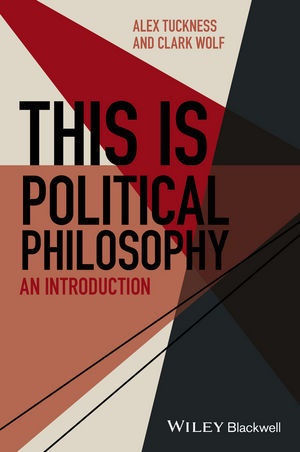Read more
Informationen zum Autor Alex Tuckness is a Professor at Iowa State University in the departments of Political Science and Philosophy. His research focuses on toleration, mercy, punishment, international humanitarianism, and public service ethics. He is the author of Locke and the Legislative Point of View (2002) and The Decline of Mercy in Public Life (with John Michael Parrish, 2014) as well as numerous articles. Clark Wolf is Professor at Iowa State University in the departments of Philosophy and Political Science. His research focuses on issues in the theory of justice, the philosophy of law, and bioethics. His work on law, intergenerational justice, political liberalism, intellectual property, reproductive ethics, and environmental ethics have appeared in Ethics and other major journals. Klappentext This is Political Philosophy is an accessible and well-balanced introduction to the main issues in political philosophy written by an author team from the fields of both philosophy and politics. This text connects issues at the core of political philosophy with current, live debates in policy, politics, and law and addresses different ideals of political organization, such as democracy, liberty, equality, justice, and happiness. Written with great clarity, This is Political Philosophy is accessible and engaging to those who have little or no prior knowledge of political philosophy and is supported with supplemental pedagogical and instructor material on the This Is Philosophy series site. Zusammenfassung This is Political Philosophy is an accessible and well-balanced introduction to the main issues in political philosophy written by an author team from the fields of both philosophy and politics. Inhaltsverzeichnis How to Use this Book xiPreface xiiiPart I The Problem of Authority 11 Happiness 3Doing Political Philosophy 4Happiness, Welfare, and the Aims of Government 5If You're Happy Do You Know It? 5The Pursuit of Happiness 6Whose happiness? 7Can you measure pleasure? 8Future happiness 10Pleasure and pain 11Is happiness fulfilling your desires? 12Do the ends justify the means? 14Nozick's Experience Machine 14Happiness and virtue 15The case of John Stuart Mill 17Capabilities 18Conflicts between liberty and happiness 22Conflicts between equality and happiness 22Happiness and Government 23Happiness and Public Goods 24Free Riding and Small Contributions 25Philosophical objections 26Should we evaluate political institutions according to their ability to make people happy? 27References and Further Reading 28Online Resources 302 Freedom 31The Meaning of Freedom 34The Fundamental Question 34What Is Freedom? And Who Is Free? 35Subjective and objective freedom 36What counts as restraining freedom? 37Freedom and consent 38Republican liberty 39Private freedom and public freedom 40Negative and positive liberty 41Paternalism, the Harm Principle, and Moralism 42Paternalism 42The harm principle 44Moralism 48Can (and should) we avoid moralism? 50Conclusion 51References and Further Reading 52Online Resources 533 Equality 54Introduction 55How Unequal Are People in the United States? 56Against Equality: A Politics of Procrustes? 57Unequal Treatment and Discrimination 59Equality as a Baseline? 61Equality of Resources and Luck Egalitarianism 62First objection: Disabilities 62Second objection: Slavery of the talented 63Third objection: Expensive tastes 63Equality of Opportunity 64Should we level down? 66What Does Equality of Opportunity Require? 67Inequalities in the Real World 68Inequality or Deprivation? 71Is Sufficiency Enough? 73Complex Equality 73Race, Gender, and the Social Construction of Inequalities 75Affirmative Action 76Conclusion 78References and Further Reading 78Online Resources 804 Justice 81Justice: A Brief I...

